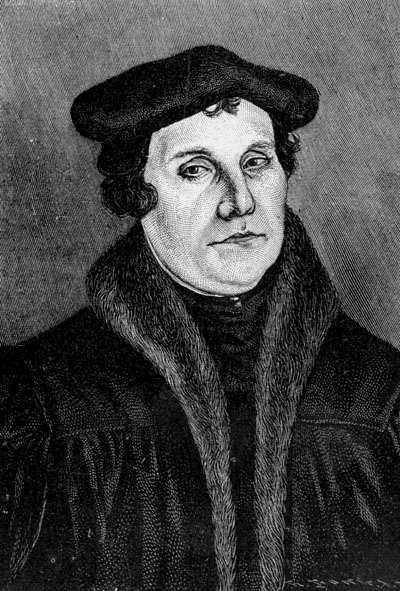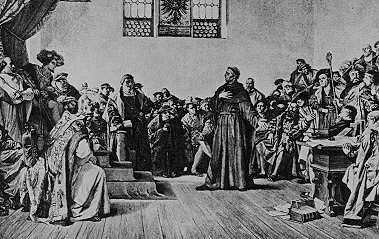Remembering the Reformation
Jeffrey Khoo

“Behold, I send you forth as sheep in the midst of wolves: be ye therefore wise as serpents, and harmless as doves. But beware of men: for they will deliver you up to the councils, and they will scourge you in their synagogues; And ye shall be brought before governors and kings for my sake, for a testimony against them and the Gentiles. But when they deliver you up, take no thought how or what ye shall speak: for it shall be given you in that same hour what ye shall speak. For it is not ye that speak, but the Spirit of your Father which speaketh in you” (Matt 10:16-20).
Luther’s 95 Theses
On October 31, 1517, Martin Luther shook the foundations of the Roman Catholic Church (RCC) by posting his 95 Theses on the door of the Castle Church in Wittenberg.
What were the 95 Theses all about? They were actually statements against the practice and sale of indulgences or forgiveness tickets. The RCC had taught that the forgiveness of sins could be purchased with money. One could also buy indulgences on behalf of the dead who were in purgatory suffering the punishment of sins yet unpardoned.The sale of indulgences is of course totally against the teaching of the Holy Scriptures, for the forgiveness of sins is free of charge. The Lord Jesus Christ had already paid redemption’s price in full with His precious blood (1 Pet 1:18-19). God freely forgives all who will confess and repent of their sins, and trust only in Christ to save them (Rom 10:9, 1 John 1:9). The false doctrine and practice of indulgences thus undermines the doctrine of justification by grace through faith in Christ alone.
Luther was regenerated in 1515 upon knowing and believing that justification was purely by the grace of God through faith and not by works as taught by the RCC which he served. Since then he was against many of the teachings and practices of the RCC, and was preaching the gospel to his church members, and exposing the errors of the papacy to his university students.
In 1517, Luther went public in exposing the false teachings and corrupt practices of the RCC. He wrote and posted his 95 Theses for the public eye. This took no small courage and resolve. What made Luther do this? It was the sale of indulgences to raise money to beautify St Peter’s Basilica in Rome. John Tetzel was appointed by the Pope to be the chief salesman of these forgiveness tickets. To boost his sales, Tetzel created an enticing jingle, “Once your money in my box clinks, the soul in purgatory springs.” It was the straw that broke the camel’s back. Filled with holy anger, Luther wrote his 95 Theses which pointedly and explicitly exposed the evils of indulgences.
On October 31, 1517, at high noon, Luther nailed his 95 Theses to the door of the Castle Church at Wittenberg. The nailing was most timely for the next day was All Saints’ Day and many would be gathered in church. The 95 Theses attracted a lot of publicity. Luther’s 95 Theses were not only read by members of the Wittenberg Church but copied, printed and distributed all over Germany. In the fullness of time, God began to reform His Church, and nothing could stop it.
Diet of Worms
Needless to say, Luther’s public act of exposing the heretical doctrines and corrupt practices of the RCC incurred the wrath of the Pope who issued a papal bull (Latin “bulla” meaning “a seal”) calling all Catholics to reject Luther’s teachings and burn his writings. How did Luther respond? Well, he gathered all his University colleagues and students together and in their presence burned the papal bull. As he cast the bull into the flames, he said, “As thou (the Pope) hast vexed the Holy One of God (Jesus Christ), may eternal fire vex thee.” He denounced the Pope as an Antichrist. Luther took a path of no return. It was Luther versus the Pope—the most powerful man in Rome at that time, even more powerful than the emperor himself. Would Luther be able to stand and withstand the political and religious might of Rome?
In 1521, Luther was summoned by Emperor Charles V to appear before the Diet of Worms. Although Rome had promised Luther safe passage, Luther’s friends warned him not to go because they feared it could be a trap for John Huss had been promised the same but that promise was not kept. Huss was burned at the stake. But Luther replied his friends, “If there are as many devils in Worms as tiles on the housetops I will still go there.”
So on April 17, 1521, Luther made his way to the meeting hall in city of Worms. The people crowded the streets to see this man who dared to stand against the might of Rome. Luther had a hard time getting to the venue due to the crowd. When he finally reached the entrance, a brave and godly knight said these encouraging words to him, “My poor monk, my poor monk, you are on your way to make such a stand as I and many of my knights have never done in our toughest battles. If you are sure of the justice of your cause, then forward in the Name of God, and be of good courage—God will not forsake you.”
The Diet of Worms was convened to try Luther for teaching the doctrines of justification by grace alone, through faith alone, in Christ alone, based on Scripture alone. It was one poor, lonely but Spirit- filled monk versus 206 men of rank and power—the combined might of political and religious Rome. The presiding officer was Dr John Von Eck who began the proceedings by asking Luther two questions. Pointing to a table displaying the writings of Luther, he asked (1) Are you the author of these writings? and (2) Are you willing to retract all the doctrines contained in these writings of which the Church disapproved? To the first question, Luther replied with a yes. To the second, he asked to be given time to think because he did not wish to reply unwisely or to say something that would be against the Word of God. Luther’s request was granted. The meeting was adjourned until the next day.
Luther spent much of that night agonising in prayer. He prayed, “O God, my God, be with me and protect me against my enemies of the world. Thou must do it, Thou alone, for in me is no strength. It is thy cause, O God, not mine. On thee I rely, not on man, for that would be in vain. O God, dost Thou not hear? Do not hide thy face from me. Thou hast called me, now be my stay, I ask it in the Name of thy Son, Jesus Christ, my Protector, my Shield and my Defence.”
April 18, 1521 was the greatest day in Luther’s life. He was ready. Dr Eck asked Luther if he would recant his teachings and withdraw his writings. Filled with the Holy Spirit, Luther gave a reply that shook the very foundations of the RCC to this day, “Unless I am convinced by testimonies of the Scriptures or by clear arguments that I am in error—for popes and councils have often erred and contradicted themselves—I cannot withdraw, for I am subject to the Scriptures I have quoted; my conscience is captive to the Word of God. It is unsafe and dangerous to do anything against one’s conscience. Here I stand; I cannot do otherwise. So help me God.”
All hell broke lose. The assembly accused him of introducing a new doctrine and called him a heretic. The emperor stormed out of the hall shouting, “How could one monk be right and 1000 years of Christendom be wrong.” Of course, the emperor knew only of a Christianity that had been corrupted, which was not true Christianity at all. Luther was not introducing something new, but reintroducing to the people the good old liberating faith of the Lord Jesus Christ as taught in the Holy Scriptures—the sole and supreme authority of the Christian’s beliefs and practices.
On April 25, 1521, Luther left Worms. Not long after, the emperor declared him an outlaw and anyone who helped him with food and lodging would be charged with high treason.
The Protestant Faith
That there are so many Protestant churches all over the world today attests to the fact that our Almighty God is sovereign and His Word is faithful and true for our Saviour had promised, “And I say also unto thee, That thou art Peter (“Petros” only “a little stone”), and upon this rock (“Petra” which is none other than Jesus Christ Himself, the Son of the living God) I will build my church; and the gates of hell shall not prevail against it” (Matt 16:18).
Luther wrote a hymn in memory of his experience at Worms:
A safe stronghold our God is still,
A trusty shield and weapon;
He’ll help us clear from all the ill
That hath us now o’ertaken.
The ancient prince of hell Hath risen with purpose fell;
Strong mail of craft and power
He weareth in this hour—
On earth is not his fellow.
God’s Word, for all their craft and force,
One moment will not linger,
But, spite of hell, shall have its course,
‘Tis written by his finger.
And though thy take our life,
Goods, honour, children, wife,
Yet is their profit small,
These things shall vanish all,
The city of God remaineth.
Let us never forget Martin Luther and the 16th Century Protestant Reformation. To God be the glory great things He has done!

“My conscience is captive to the Word of God … Here I stand. I can do no other. God help me.” (Martin Luther before the Diet of Worms)


